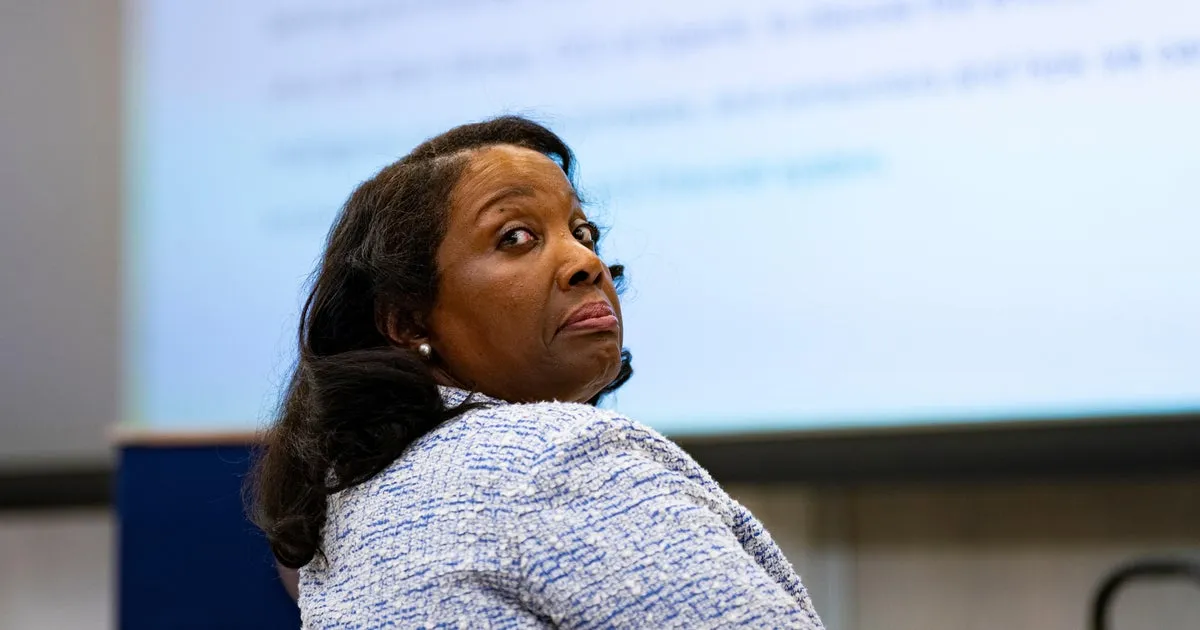
On Friday, a federal judge presided over a crucial hearing regarding the attempts of Federal Reserve Governor Lisa Cook to maintain her position despite former President Donald Trump's efforts to remove her. This legal battle stems from allegations that Cook made false representations on mortgage agreements several years ago. The two-hour hearing, held before U.S. District Judge Jia Cobb, marked the first in-person confrontation between the Justice Department lawyers and Cook's legal team following her lawsuit, which was filed on Thursday.
Cook's legal representatives are seeking a temporary restraining order that would deem Trump's termination attempt unlawful, allowing her to continue serving as a member of the Federal Reserve's Board of Governors. Judge Cobb, appointed by President Joe Biden, did not reach a decision immediately. She emphasized that the case raises significant questions, particularly regarding the president's authority to remove a governor from the Fed, which is designed to be an independent entity free from political pressures.
Lisa Cook was appointed to her role by Biden in May 2022 and subsequently reappointed for a full 14-year term set to conclude in January 2038. In her lawsuit, Cook contends that Trump's actions violate the Federal Reserve Act, which stipulates that a president can only remove a Board member for cause. In his termination letter, Trump asserted he had sufficient grounds for her removal, citing a letter from Bill Pulte, director of the Federal Housing Finance Agency, who alleged Cook made false statements regarding her principal residence in mortgage documents.
Pulte accused Cook of misrepresenting two properties in Michigan and Georgia as her principal residence in 2021 to secure more favorable lending terms. Importantly, Cook has not faced any civil or criminal charges related to these allegations. Her legal team mentioned in court filings that any errors in her mortgage forms occurred before she took office as a Federal Reserve governor, arguing that none of the alleged misconduct transpired during her tenure in the role.
During the hearing, Cook's lawyer, Abbe Lowell, argued that her termination was based solely on Pulte's accusations without any formal notice or opportunity to respond, violating her due process rights. He highlighted the rapid timeline, noting that only 30 minutes elapsed between Pulte's public allegations and Trump's call for Cook to resign. Lowell suggested that the allegations of fraud have become a tool for the Trump administration to dismiss officials, especially those who may not align with the administration's policies.
Cook's lawsuit claims that Trump's actions are unprecedented and illegal, representing the first time a sitting president has attempted to remove a Federal Reserve governor in the institution's 112-year history. Her attorneys argued that the for cause standard in the Federal Reserve Act is not clearly defined and that other laws protecting independent agency members from termination require evidence of inefficiency, neglect, or malfeasance.
Throughout the hearing, Judge Cobb pressed Lowell on the implications of applying removal protections from other laws to the Federal Reserve Act. She expressed concerns about the potential for a president to influence the central bank's composition by seeking to remove governors who disagree with them on economic policy. Cobb also questioned the appropriateness of allowing a president to retroactively assess the actions of previous administrations.
Cook's lawsuit names Trump, the Board of Governors, and Fed Chair Jerome Powell as defendants. Meanwhile, a lawyer for the Federal Reserve indicated that the institution would adhere to any court directives without making arguments against Cook's removal. In a separate filing, Justice Department lawyers defended Trump's attempt to oust Cook, arguing that discrepancies in financial documents provide sufficient grounds for termination.
The Justice Department contended that federal courts should not interfere with the president's judgment regarding what constitutes cause for removal. However, they acknowledged that any judicial review must be highly deferential to preserve the president's constitutional authority. During the hearing, Judge Cobb raised concerns about the possible implications of allowing a president to unilaterally determine the cause for a governor’s removal, especially if such reasons could be proven false.
Lisa Cook's situation is part of a broader pattern in which Trump has attempted to remove Democratic appointees from various independent agencies since returning to the White House. This includes officials from the National Labor Relations Board, Merit Systems Protection Board, and more. Some of these removals have led to legal disputes, with the Supreme Court suggesting that the Federal Reserve operates under a unique structure that may offer it different protections compared to other agencies.
As this legal battle unfolds, the implications for the Federal Reserve's independence and governance are significant, raising questions about the balance of power between the executive branch and independent regulatory bodies.